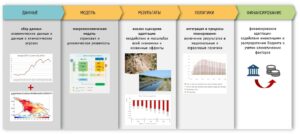
POLICY ADVICE FOR CLIMATE-RESILIENT ECONOMIC DEVELOPMENT (CRED II)
Partner countries: Georgia, Kazakhstan, Viet Nam (until 03/2023)
Funder: Federal Ministry for the Environment, Nature Conservation, Nuclear Safety and Consumer Protection (BMUV)
Duration: 01.2019 – 06.2025
Budget: 6,000,000 EUR
Result: Methods for assessing and planning climate-resilient economic development are available and are being applied for implementing NAPs and the adaptation components of NDCs.
Enabling Climate-Resilient Economic Development
Climate change is one of the greatest threats facing humanity, with far-reaching and devastating impacts on people, the environment, and the economy. Accelerating climate change adaptation is a human, environmental, and economic imperative. Planning and investing in systematic adaptation actions, and in the innovations that come with it, can unlock new opportunities, and provide a triple dividend: they avoid economic losses, support economic growth, and deliver additional social and environmental benefits.
Assessing Climate Risks and Improving Adaptation Actions
Systematic, effective, and growth-aligned adaptation actions need an improved evidence based for assessing the climate related risks that economies are facing. They enable deciding on the most efficient adaptation strategies.
Including macroeconomic effects into assessment and planning of adaptation actions enables policy actors to make the necessary investments for directing the economy towards climate resilience.
Risks without Systematic Adaptation Actions:
- National development strategies will be ineffective, maladaptation occurs, and fragmented adaption will cause welfare losses.
- National budgets will come under additional strain, potentially putting downward pressure on sovereign ratings as debts and deficits mount.
- Globally, climate change could push more than 100 million people within developing countries below the poverty line by 2030.
Our Approach
On behalf the of the German Federal Ministry for the Environment, Nature Conservation, Nuclear Safety, and Consumer Protection (BMUV) under the umbrella of the International Climate Initiative (IKI), the CRED programme supports its partner countries in the development of human and technical capacities in the economic and planning ministries, subordinate sectoral authorities as well as in the institutes in charge of economic modelling.
Therefore, the CRED programme develops and disseminates methods and tools for Climate Economic Modelling. It enables partners to independently model the economic impacts of climate change and translate results into policy advice. Evidence-based adaptation actions can be incorporated into long-term economic, and adaptation planning and thereby unlock climate-resilient economic development in the partner countries.
Climate data and results from sector models need to be fed into macroeconomic models to map the impacts of climate change on social and economic aspects such as income or employment and to further identify appropriate adaptation actions.
The cornerstones of the CRED programme are three jointly developed country-specific macroeconomic models: the Dynamic Input-Output Models e3.kz in Kazakhstan and e3.ge in Georgia and the Dynamic General Equilibrium Model DGE-CRED in Viet Nam. These models enable our partners to model the economic impacts of climate risks.
Key Steps of Building and Applying a Climate-Sensitive Macroeconomic Model
The modelling results will be used to create country specific policy advice and recommendations on implementation options for adaptation policies. The CRED programme supports our political partners in the integration of adaptation policies into macroeconomic strategies and policies, such as development, poverty-reduction, or green economy strategies as well as strategies for major economic sectors.
By that the CRED programme aims at an alignment of nationally determined contributions (NDCs) goals and national adaptation plans (NAPs). In addition to assessing adaptation actions and integrating them into policies, the CRED programme also identifies appropriate financing options.
The CRED programme promotes international exchange by sharing project experience and developing communication materials. The aim here is that macroeconomic models for adaptation planning should be used beyond the partner countries. For this purpose, CRED is cooperating with another GIZ programme called DIAPOL-CE in Nigeria and Mongolia to support modeling capacity building.
CRED Process: Enabling climate-sensitive economic policies

Publications
CRED Kazakhstan
2023 Economic Impact of Climate Change Adaptation – Subnational View for Kazakhstan
2022 Country Brief: Toward Climate Resilient Economic Development in Kazakhstan
2022 Казахстан на пути к экономическому развитию, устойчивому к изменению климата
2022 National Report: Supporting Climate Resilient Economic Development in Kazakhstan
2021 Sectoral Policy Brief: Economy-wide Effects of Adaptation in Infrastructure in Kazakhstan
2021 Sectoral Policy Brief: Economy-wide Effects of Adaptation in the Energy Sector in Kazakhstan
2021 Отраслевая аналитическая записка. Казахстан: Влияние адаптации в энергетике на всю экономику
2021 Sectoral Policy Brief: Economy-wide Effects of Adaptation in Agriculture in Kazakhstan
2021 Infographic: Impacts of Climate Change and Adaptation in Agriculture
2021 Infographic: Impacts of Climate Change and Adaptation in the Energy Sector
2021 Infographic: Impacts of Climate Change and Adaptation in Infrastructure
2021 Инфографика – Казахстан: Влияние изменения климата и адаптации в сельском хозяйстве
2021 Инфографика – Казахстан: Влияние изменения климата и адаптации в секторе энергетики
2021 Инфографика – Казахстан: Влияние изменения климата и адаптации в инфраструктуре
2021 Climate Hazards Analysis for Kazakhstan
2021 Анализ опасных климатических явлений для Казахстана
CRED Global
2023 Review: Status and Potential Future Application of the CRED Approach
2023 Strengthening Decision-Making for Risk-Informed Development
2023 Handbook on Macroeconomic Modelling for Climate Resilience
2022 Global Report – Lessons Learnt from Piloting Macroeconomic Modelling for Climate Resilience
2022 Macroeconomic Modelling for Climate Policy Planning
2022 Video: Managing Climate Risks and Adaptation with Macroeconomic Models
2022 Video: Voices from CRED partners on managing climate risks with macroeconomic models
2021 Macroeconomic Models for Climate Resilience
2021 Макроэкономические модели для повышения устойчивости к воздействию изменения климата
2021 Infographic: Policy Advice for Climate Resilient Economic Development
2021 Project Brief: Climate Resilient Economic Development
2021 Using Climate Economic Modelling for Sustainable Economic Development. A Practitioner’s Guide
